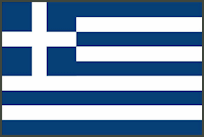Greece - Introduction
 Greece was inhabited as early as the Paleolithic period and by 3000 BC had become home, in the Cycladic Islands, to a culture whose art remains among the most evocative in world history. In the second millennium BC, the island of Crete nurtured the maritime empire of the Minoans, whose trade reached from Egypt to Sicily. The Minoans were supplanted by the Mycenaeans of the Greek mainland, who spoke a dialect of ancient Greek.
Greece was inhabited as early as the Paleolithic period and by 3000 BC had become home, in the Cycladic Islands, to a culture whose art remains among the most evocative in world history. In the second millennium BC, the island of Crete nurtured the maritime empire of the Minoans, whose trade reached from Egypt to Sicily. The Minoans were supplanted by the Mycenaeans of the Greek mainland, who spoke a dialect of ancient Greek.
Greece was part of the cradle of civilization, and its history is characterized by the rise of the Minoan culture on Crete, the rise and fall of the Myceneans on the Peleponnesos, the development of the city states of Athens and Sparta, the destruction of Athens during the Peloponnesian War, domination by the Macedonians, the creation of the Hellenistic cilivization, conquest by the Roman Empire, the establishment of the Byzantine Empire, and in 1459 conquest by the Ottoman Empire.
During the Roman, Byzantine, and Ottoman Empires (1st-19th centuries), Greece's ethnic composition became more diverse. The roots of Greek language and culture date back at least 3,500 years, and modern Greek preserves many elements of its classical predecessor.
In the 1820's Greece fought for and finally won its independence, In World War I Greece fought on the side of the Allies. In World War II, the Greeks successfully resisted an invasion from Italy. In 1941, the country was taken over by the Germans, but the Greek resistance movement continued to fight the Germans until liberation. Between 1944-49, there were 2 unsuccessful attempts by the communists to take control of the country, and 80,000 Greeks lost their lives before the hostilities ended. At independence, a constitional monarchy government was established in Greece. Throughout the 1920-74 period there was an ongoing conflict between the republican and monarchy factions in the country, and in 1967-73, a military government took over the government. In 1974 a new constitution was adopted, and the county became a presidential parliamentary republic.
Industrial development began in the early 1900s, but economic progress was seriously hindered by the depression, war, and political turmoil of the 1930s and 1940s. Between 1955-79, the economy once again grew rapidly, but then began to decline. 42% of the work force is in services, 29% in industry, and 28% in agriculture. 55% of the gross domestic product is derived from the service sector, 31% from the manufacturing and mining sector, and 14% from the inefficient agricultural sector. Tourism, commerce, and shipping are major economic activities. In 1982 the gross national product (GNP) was US$32.4 billion and per capita GNP was US$3260. In 1983, exports amounted to US$4.1 billion, and imports amounted to US$9.5 billion.
Greece's population of 9.95 million is 98% Greek, and the official language is Greek. 97% of the population is Greek Orthodox, and 2% is Muslim. Schooling is compulsory for 9 years, and the literacy rate is 89% for women and 96% for men. The infant mortality rate is 13.8, and life expectancy is 72 years for males and 75 years for female. Greece is situated on the southern tip of the Balkan Peninsula and consists of the mainland, the Peleponnesos, and numerous islands including Crete. Most of the land mass is mountainous, large areas are dry, and only 28% of the land is arable.
From the earliest time until recently, emigration from Greece to other countries was a common pattern. Since the 1960s, internal migration to urban areas was the dominant migration trend. Currently, 30% of the population lives in Athens. Despite the growing industrialization and urbanization of the population, the Greeks retain many traditional family and social values.
Eastern Orthodox Christianity is the dominant religion in Greece and receives state funding. During centuries of Ottoman domination, the Greek Orthodox Church preserved the Greek language and cultural identity and was an important rallying point in the struggle for independence. There is a centuries-old Muslim religious minority concentrated in Thrace and an estimated 300,000 Muslim immigrants living elsewhere in the country. Smaller religious communities in Greece include Old Calendar Orthodox, Catholics, Protestants, Jews, Jehovah's Witnesses, and Mormons.
Greek education is free and compulsory for children between the ages of 6 and 15. Overall responsibility for education rests with the Ministry of National Education and Religious Affairs. Private colleges and universities (mostly foreign) have campuses in Greece despite the fact that their degrees are not recognized by the Greek state. Entrance to public universities is determined by state-administered exams.
|
NEWSLETTER
|
| Join the GlobalSecurity.org mailing list |
|
|
|

